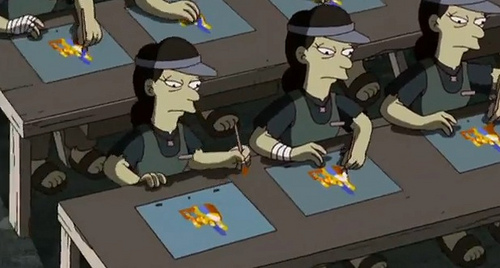

Jim Wexler of Brand Games, one of the speakers at our "Meet the Makers" event, recently pointed me to an interesting idea of of the University of Utrecht called Game Seeds. Basically, it's a way to inspire game designers to think differently about game design by forcing them to think about the actions of the character first, rather than the user.
As they explain..
"Game design usually starts off by defining the actions of the player(s). Christophe Berg at Metagama wondered if the reverse would be possible, and created a new and innovative game where the design of the characters (and their behaviour patterns) is the first step.
The result is a playful card game that confronts players with certain constraints (e.g. they don’t create a character from scratch) in order to foster their creativity, and pushing them out of their comfort zone by having to make do with the given elements.
Each Game Seeds card contains attributes and an action verb. By choosing some actions, the players start to define their characters behaviour… and by doing so create the range of actions that would be available to the end-user."
It's another reference to the importance of character in the creation of compelling content, a topic both Frank Rose and Gary Hirsch will be talking about at Influx's "Meet the Makers" (a "lab for a day") taking place at Milk Studios in NYC on December 3rd.
Information about the event can be found here.
Posted by Ed Cotton
These are reactions to a radical new book design from Visual Editions, a UK based publisher with a new take on the reading experience. The book is "Tree of Codes" and it's author Jonathan Safran Foer's experiment to cut-in, using die-cuts to his favorite book, "The Street of Crocodiles" by Bruno Schultz.
An amazing company, Die Keure in Belgium made it happen.
Here's a page from the book.


Banksy's recent opening title sequence for The Simpsons confused many who had probably heard or seen about "Exit Through the Gift Shop" and assumed it was a fake of giant proportions and nothing that would ever see the light of day on American television.
However, according to sources at the NYT, it appears this isn't a fake and Banksy might have been involved.
According to a Simpsons spokesperson.
"We went through people who made the movie, so I assume they would know the real him."
The Simpsons has been on air for decades and is one of the most respected shows on US TV, its frequently pushed the envelope and always had a sharp take on pop culture.
Banksy's latest effort pushes things pretty far and takes a right-handed power jab at the world of Asian outsourcing, even exploring the mythology around the production of the show itself.
Obviously, Matt Groening has pretty much full creative control of his content and as far as Fox is concerned, they can probably do little to touch him. Groening has earned his right after years of consistently high ratings that's meant the show has generated advertising revenue in the billions for Fox.
Also, turning a blind eye and siting creative control, probably doesn't exactly harm the ratings.
Posted by Ed Cotton
Vanity Fair spent some time with Michael Lombardi to understand the secrets of the network's success, based on the article, here are HBO's rules for success.
1. Work with the best:
“We really have the good fortune or the smarts to do business with the right people,” he says, “because, as much credit as we’d like to take for those nominations, they really reflect the talent we do business with.”
2. It’s all about the writing:
“We start with an unmitigated respect for writers and the written word. You can talk to any film or television writer and hear their experiences both in the big screen and smaller screen universe, and they’ll give repeated examples where they feel like their voice got muzzled, muffled, muddled by input, rather than supported. What we’re looking for is writers who have a distinctive voice, a unique perspective, a strong story-telling sense, to let them do their best work.”
3. HBO isn't like everyone else:
We’re not a place that develops by consensus or by committee… That’s why we don’t ‘focus group’ our shows. That’s just not the business we’re in.... We’re not looking to be shows that get the biggest number of eyeballs in the world, we’re not selling ad space.”
4. Stay ahead of your competition:
We’re not a place that develops by consensus or by committee… That’s why we don’t ‘focus group’ our shows. That’s just not the business we’re in.... We’re not looking to be shows that get the biggest number of eyeballs in the world, we’re not selling ad space.”
5. Quality is everything:
in essence, the HBO formula could probably be boiled down to, “It’s the Script, Stupid.” Or as Lombardo more eloquently put it: “The first mantra here has always been quality ... not number of eyeballs, not the flashiest show. Quality. And that’s held us in good stead.”
Posted by Ed Cotton
Since the show is set in the era prohibition era, it might seem surprising to see Canadian Club playing such a prominent role, but apparently the brand was firmly associated with the period; Al Capone was rumored to have smuggled the brand from Windsor Canada, to Detroit.
Obviously a Scorsese show for HBO is going to get attention and it's probably going deal with some edgy content and themes- something you wouldn't have thought these three brands would have wanted to be part of. However, they've probably seen the success of the Mad Men as another period piece and seen the opportunity to gain cultural propulsion by taking some risks.
This is a nice deal for both parties because HBO get's an inside track on a lot of interesting free media- like store windows in Bloomingdales, hotel rooms in Atlantic City and a partnership in speakeasy parties organized by Canadian Club.
The challenge for these brands is to make sure they can "own" something out of this deal and really play a role. If they are just seen as mere "sponsors", they won't have capitalized on the opportunity correctly. Clearly this is not their creative idea and content and there's a danger these brands could get lost in the shuffle.
There's something of a gamble going on here on a couple of levels
1. A Scorsese TV series will be a hit
2. The 1920s will make a cultural comeback
The first point is likely given the man's track record Less likely are the 20s making a cultural comeback; while there can be some parallels drawn with the recession, it's past history that's difficult to connect with, unlike Mad Men, where you can clearly see the line between that past and today.
The best these brands can hope for is that the relevance in the glamor, sophistication and drama of the period can be tapped and turned into something.
For Canadian Club, a brand that's not afraid to take risks, it will be interesting to see how far they push this association.
Posted by Ed Cotton
Take a look at this case study video from the folks at Topspin, who recently helped the Pixies sell out two London dates in just over a week. (Original story on Cnet)
Topspin Ticketing - Pixies @ The Troxy, London June 2010 from ian rogers on Vimeo.
Posted by Ed Cotton
